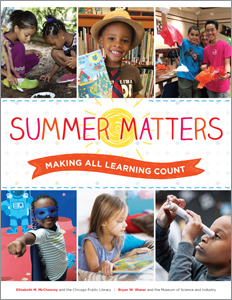Primary tabs
You don't need to be an ALA Member to purchase from the ALA Store, but you'll be asked to create an online account/profile during the checkout to proceed. This Web Account is for both Members and non-Members.
If you are Tax-Exempt, please verify that your account is currently set up as exempt before placing your order, as our new fulfillment center will need current documentation. Learn how to verify here.
- Description
- Table of Contents
- About the authors
- Reviews
illustrations by Steve Musgrave
Summer reading for children is a long standing and cherished tradition in public libraries across America, but today's kids need to master new skills and competencies. Today's summer programming needs to move beyond reading to engage children with hands-on activities, thus keeping their brains active even when school's out. Here, a team of librarians and educators from the Chicago Public Library (CPL) and Chicago's Museum of Science and Industry present a guide based on their award-winning, STEAM-inspired approach. They outline practical steps for libraries and cultural institutions to partner in creating a sustainable summer learning program that's both fun and educational. This book
- explains what STEAM is and why it's important for libraries;
- provides evidence-based research on summer slide, the achievement gap, and 21st century learning skills;
- walks readers through building a cultural partnership, collaborating efficiently, and sustaining the relationship into the future;
- offers tips for managing institutional change;
- provides guidance for developing a new vision for summer at the library, with pointers on adding learning tracks to existing programs and addressing design challenges;
- details how CPL evaluates and assesses their program; and
- includes templates for a Memorandum of Understanding (MOU), mission statement, logic model, and sample Summer Learning Challenge evaluations.
Loaded with innovative program ideas, this resource will ensure that learning continues even while school is out.
Foreword, by Matthew Boulay, Ph.D.
Preface: I Only Want to Do What I Want to Do, by Elizabeth M. McChesney and Bryan W. Wunar
Acknowledgments
Letter from Brian Bannon
Letter from Mayor Rahm Emanuel
Chapter 1 Rationale for Change
Chapter 2 The Role of STEAM
Chapter 3 Partnerships: Stronger Together
Chapter 4 All Learning Counts
Chapter 5 Giving It Context with Books
Chapter 6 Evaluation, Assessment, and Continuous Improvement
Chapter 7 Managing Change
Afterword
Appendixes
A. Sample Group Agreement Form
B. Sample Branch Staff Evaluation for Summer Learning Challenge
C. Sample Librarian Post-Training Evaluation
D. Recommended Resources
E. Stores and Vendor List
Bibliography
About the Authors
Index
Elizabeth M. McChesney
Recipient of ALSC’s 2021 Distinguished Service Award, Elizabeth M. McChesney has more than three decades of experience in children’s librarianship. In 2012, as the Director of Children’s Services for the Chicago Public Library she led her team through the transformation of the summer reading program to the nationally-recognized Summer Learning Challenge. This achievement earned her a Library Journal Movers & Shakers Award, the Founder’s Award for Excellence from the National Summer Learning Association and the John Cotton Dana Award. Liz believes in the role of STEAM-based library learning and finds great joy in watching children play, read, and learn in libraries and throughout the community in library-led learning. Liz writes and speaks extensively about library service to children, building successful partnerships, and the role of the 21st Century Library. She passionately believes in the public library as a place of learning and education, joy and wonder for America’s kids and is now serves as a consultant in helping empower librarians across the country to do the same.
Bryan W. Wunar
Bryan W. Wunar has worked in science education for the past 24 years. His work and research have focused on bridging informal and formal science education in order to extend learning beyond the classroom. He is currently the director of community initiatives in the Center for the Advancement of Science Education at the Museum of Science and Industry in Chicago. In this role, he leads the museum's strategic efforts to engage youth, families, and communities in science learning experiences. He has served as the associate vice president for education and programs at Chicago's Adler Planetarium, senior director of the Science and Mathematics Curriculum Program at the Education Development Center, and as the director of the Alliance for Community Education at Loyola University in Chicago. Wunar holds a BS degree in biology, an MA degree in curriculum and instruction, and has completed all the coursework toward a PhD in educational psychology, all from Loyola University in Chicago.
"The book provides an excellent blueprint to follow with well-laid-out chapters starting with the rationale for change and ending with managing change … I believe the book is a good resource for any library that wants to do a better job with summer programs but also for other institutions that would like to have a quality summer learning program for children."
— ARBA
"Clear, detailed ... Librarians looking for ways to enrich the nonfiction content of summer programming and to partner with another educational institution will find beneficial strategies from this accessible resource."
— School Library Journal
"Throughout the book, practical insets and sidebars are included, enhancing the book’s utility and making it more of a manual than a simple narrative ... Summer Matters is an inspirational and informative guide that offers practical, hands-on advice for any public library or educational institution serving youth. It clearly demonstrates how and why the addition of inquiry based participatory learning to traditional summer programs benefits not just patrons but entire communities."
— Reference & User Services Quarterly



